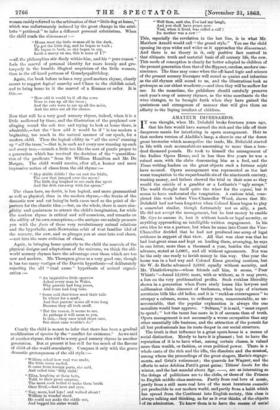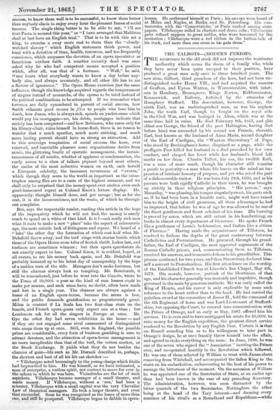AMATEUR IMPRESARIOS.
IT was thought, when Mr. Delafield broke fourteen years ago, that his fate would have warned the rich and the idle off their dangerous mania for interfering in opera management. Heir to that modern version of Aladdin's lamp, a share in one of the dozen great breweries which monopolize the trade, Mr. DeIafield started in life with cash accumulations amounting to more than a hun- dred thousand pounds. He took to himself the management of the Italian Opera House, and in less than five years he was a ruined man, with the clubs denouncing him as a fool, and the Times writing leaders on the great objects such a fortune might have secured. Opera management was represented as the last worst temptation to the unpardonable sin of the nineteenth century, wasting money, and fathers showed the trial to their sons as they would the suicide of a gambler or a Lothario's "ugly scrape." The world thought itself quite the wiser for the exposé, but it seems to have underrated the temptation. A curious trial, com- pleted this week before Vice-Chancellor Wood, shows that Mr. Delafield had not been forgotten when Colonel Knox began to play a somewhat similar, though fortunately not so silly, a part. He did not accept the management, but he lent money to enable Mr. (lye to assume it, lent it without bonds or legal security, or anything approaching an intelligible written engagement. In his own idea he was a partner, but when he came into Court the Vice- Chancellor decided that he had not produced one scrap of legal evidence in support of that view. All that was clear was that he had lent great sums and kept on lending them, averaging, he says in one letter, more than a thousand a year, besides the original advance, stated at 5,0001., and all without agreements. Nor was he the only one ready to lavish money in this way. One year the house was in a bad way and Colonel Knox growing cautious, but Sir W. de Bathe advanced 3,000/. equally without security, and Mr. Thistlethwayte—whose friends call him, it seems, "Poor Whistle "—found 12,000/. more, with or without, as it may prove, a lien on the very problematical profits. Such reckless liberality shown in a generation when Peers study leases like lawyers and millionaires claim discount of tradesmen, when boys of nineteen scrutinize bills like old ladies, and it is "reckless extravagance" to overpay a cabman, seems, to ordinary men, unaccountable, so un- accountable, that the popular explanation is always the one moralists would least approve. "Sultans," it is said, "must expect to spend ; " but the taunt has more in it of sarcasm than of truth. Opera management is not necessarily a worse occupation than any other essentially idle business, and the attraction of the pursuit for all but professionals has its roots deeper in our social structure.
The truth is that influence in a great opera house is a means of
social distinction. Merely to have it is pleasant ; but to have the reputation of it is to have what, among certain classes, is valued more than wealth, or fashion, or even political power. There is a whole caste of the rich and the idle, the dissolute and the musical, among whom the proceedings of the great singers, Mario's engage- ments, and Grisi's retirement ; the quarrels for Wagner, and the efforts to seize Adelina Patti's great gains; Titiens' locale for the winter, and the last scandal about Sgr. --, are as interesting as the doings of politicians are to the clubs, or those of the Princes to English middle-class matrons. Partly from real love of music, partly from a still more real love of the most luxurious ensemble yet producible in our modern world, and partly from a habit which has spread from the Continent into English society, this class is always talking and thinking, as far as it ever thinks, of the objects of its admiration. To know them is to have the means of social
success, to know them well is to be successful, to know them better than anybody else is to enjoy every hour thepleasant fumes of social incense. The single thing better is to be able to say, "ill see that Pasta is secured this year," or-"! have arranged that Malihran shall at last have an English trial." That is to be with this set a king, to exercise a sway more real to them than the " closely- watched slavery" which English statesmen think power, and hunt with a devotion of time, health, resources, and too frequently
conscience, which surpasses the devotion of an opera speculator as fanaticism outdoes faith. A courtier recently dead was once asked why he who had competent means accepted a position which, after all, was that of a footman. "Well," he said, *4 o n e hears what everybody wants to know a day before any- body else, and always accurately, and all other lift has to me a flavour of ignorance." The Opera House exercises just the same influence, though the knowledge acquired regards the temperament of singers instead of monarchs, of the operas to be tried instead of the political combinations to be attempted. If we remember what fortunes are daily squandered in pursuit of social success, how Smith exhausts good means in fetes to people who bore him to death, how Jones, who is always sick, spends on yachts sums which would pay his mortgages—no, his debts, mortgages indicate that society has been conquered—and how Robinson, who cares only for his library-chair, ruins himself in horse-flesh, there is no reason to wonder that a much speedier, much more enticing, and much more lasting pursuit should have so strong an attraction. Add to this sovereign temptation of social success the keen, ever renewed, and insatiable pleasure some organizations derive from music, the glittering bustle of operatic management, the instan- taneousness of all results, whether of applause or condemnation, the ready access to a class of talkers piquant beyond most others, the smiles of the most seductive women on earth, each herself a European celebrity, the incessant recurrence of "events," which though they seem to the world as important as the catas- trophes among flies are to a caste of the highest moment, and we shall only be surprised that the money spent ever excites even such good-humoured regret as Colonel Knox's letters display. He, apparently, thought himself done, and got savage ; but as for the cost, it is the inconvenience, not the waste, of which he through- cut complains.
But, says the respectable reader, reading this article in the hope of the impropriety which he will not find, the money is surely much to spend on a whim of that kind. Is it ?—ask really rich men -what it costs to make a new "place" take the aspect of aristocratic age, the mere outside look of fittingness and repose. We heard of a "lake" the other day the formation of which coat half what Mr. Delafield threw away, and the turf rings with stories beside which those of the Opera House seem tales of Scotch thrift. Lakes last, and turfmen are sometimes winners ; but then opera speculators do not exactly expect to lose. Colonel Knox, it is evident, hoped, at all events, to see his money back again, and Mr. Delafield was probably haunted up to his latest day of managership by the hope of a sudden turn of the tide. Managers don't make fortunes, but still the chances always look so tempting. Mr. Boucicault, it will be remembered, just before he went into the Gazette, wrote to -the Times of 30,000/. a year as the kind of sum lessees ought to make per annum, and such sums have, no doubt, often been made and lost in a single year. The chances are always against a lessee of an English opera-house, because the arena is free, and the public demands gratification so preposterously great. Milan is content if La Scala has two first-class stars on the boards, and French opera-goers only expect one at a time ; but Londoners ask for all the singers in Europe at once. Mr. Gye the other day had seven celebrities in the house — and if they are not engaged some rival enamoured of distinguished ruin snaps them up at once. Still, even in England, the possible prizes are considerable, every form of business gambling is sure to attract devotees, and the attraction of opera-house management is no more inexplicable than that of the turf, the cotton market, or the Stock Exchange. It yields what they do not besides the 'chances of gain—life such as Mr. Disraeli described in, perhaps, the shortest and best of all his kit-cat sketches :— " Villebecque acted becomingly to the young charge which Stella had bequeathed to him. He was himself, as we have intimated, a man of enterprise, a restless spirit, not content to move for ever in the sphere in which he was born. Vicissitudes are the lot of such aspirants. Villebecque became manager of a small theatre, and made money. If Villebecque, without a sou,' had been a schemer, Villebecque with a small capital was the very Chevalier Law of theatrical managers. He took a larger theatre, and even that succeeded. Soon he was recognized as the lessee of more than one, and still he prospered. Villebecque began to dabble in opera-
houses. He enthroned himself at Paris ; his envoys were heard of at Milan and Naples, at Berlin and St. Petersburg. His con- troversies with the 'Conservatoire' at Paris ranked among state papers. Villebecque rolled in chariots and drove cabs ; Villebecque gave refined suppers to great nobles, who were honoured by the invitation ; Villebecque wore a red ribbon in the button-hole of his frock, and more than one cross in his gala dress."































 Previous page
Previous page